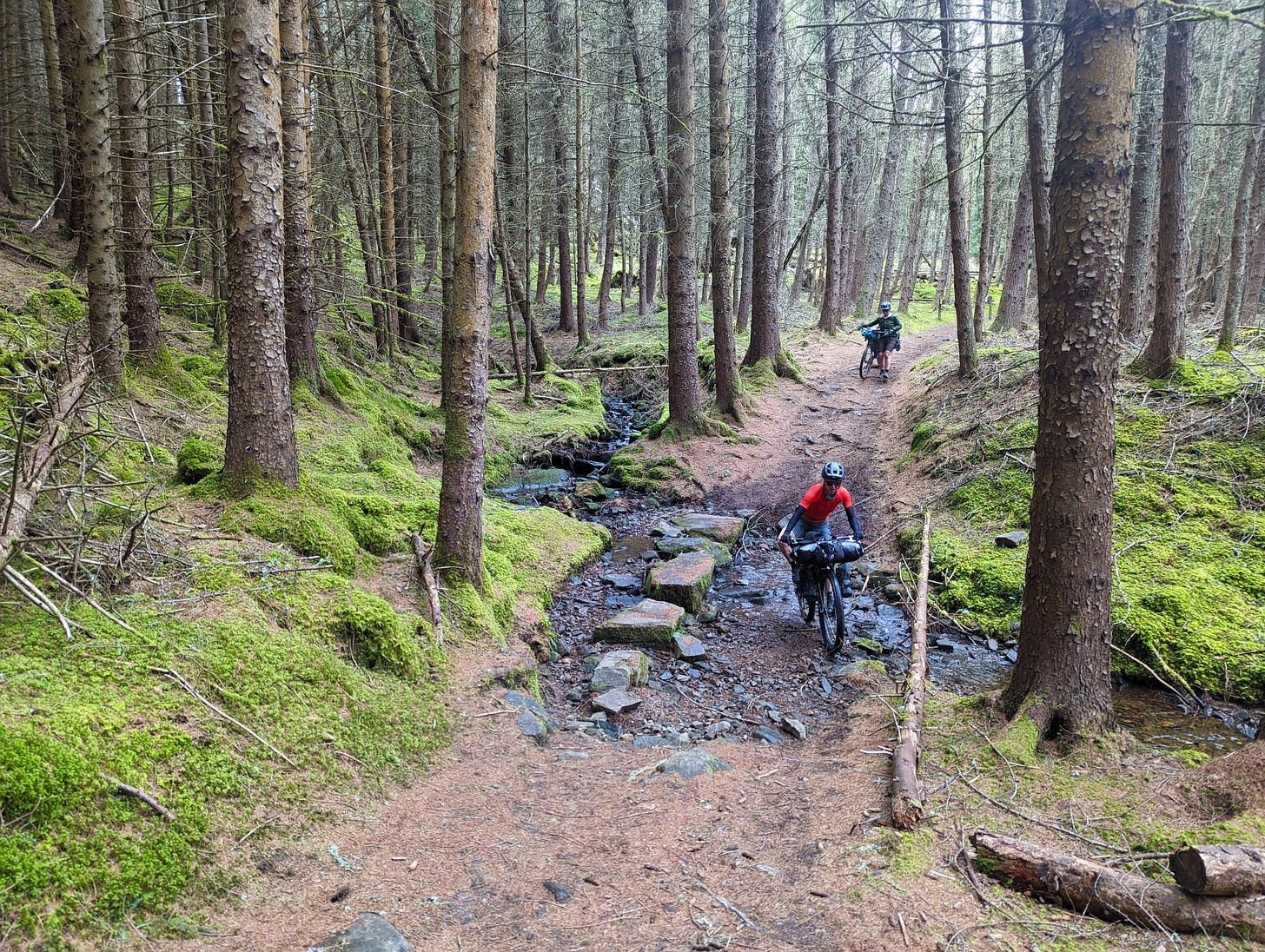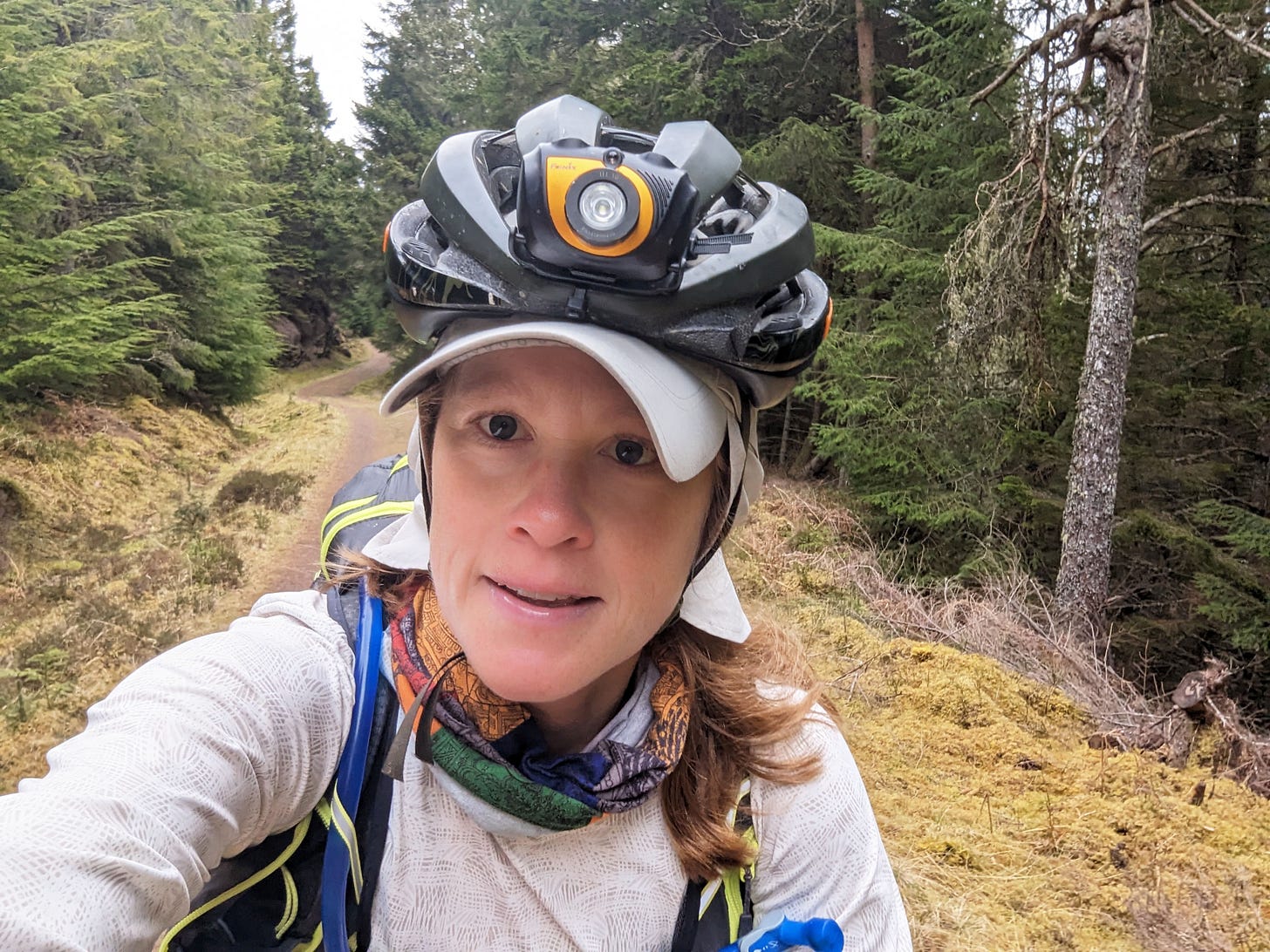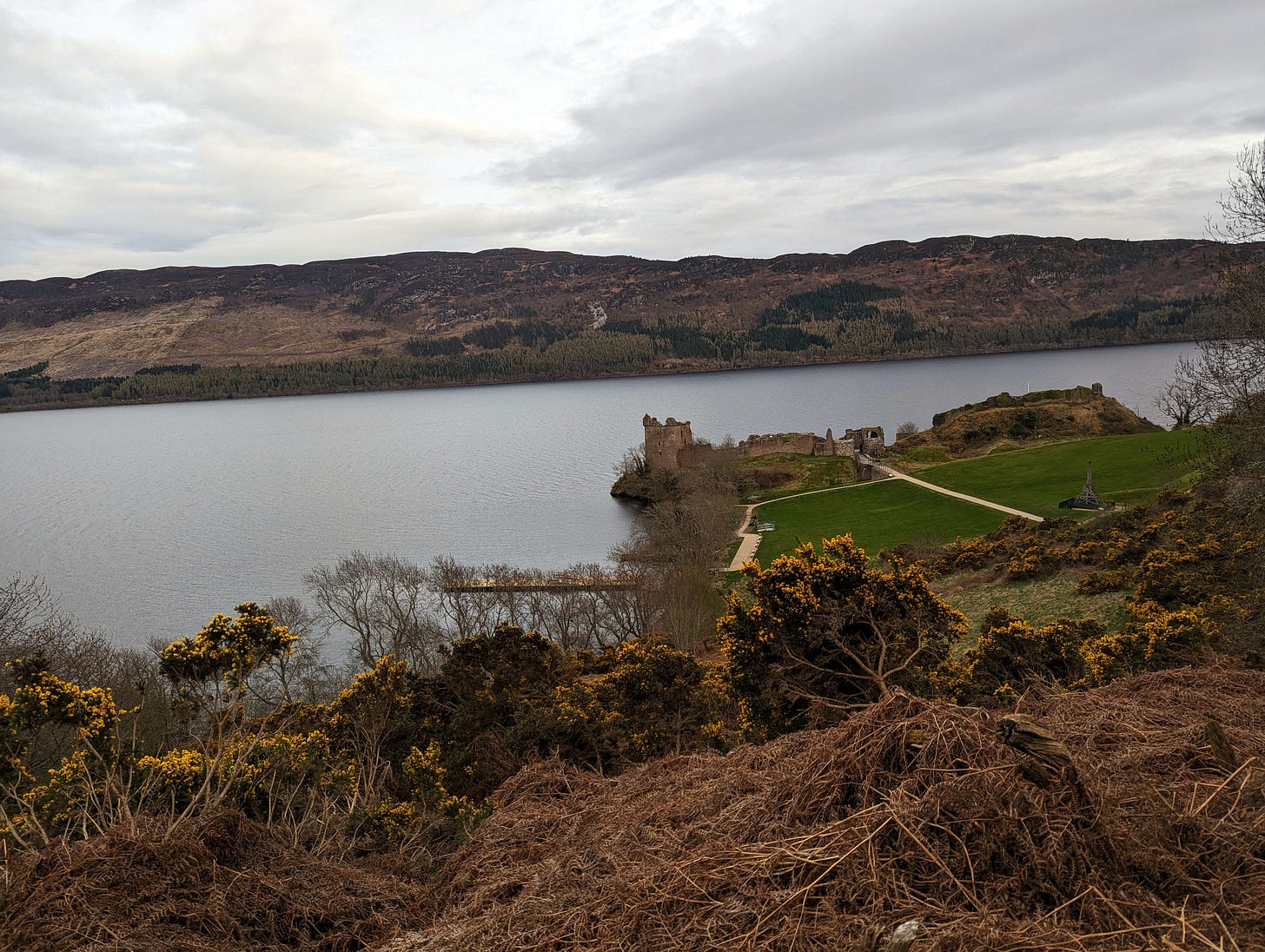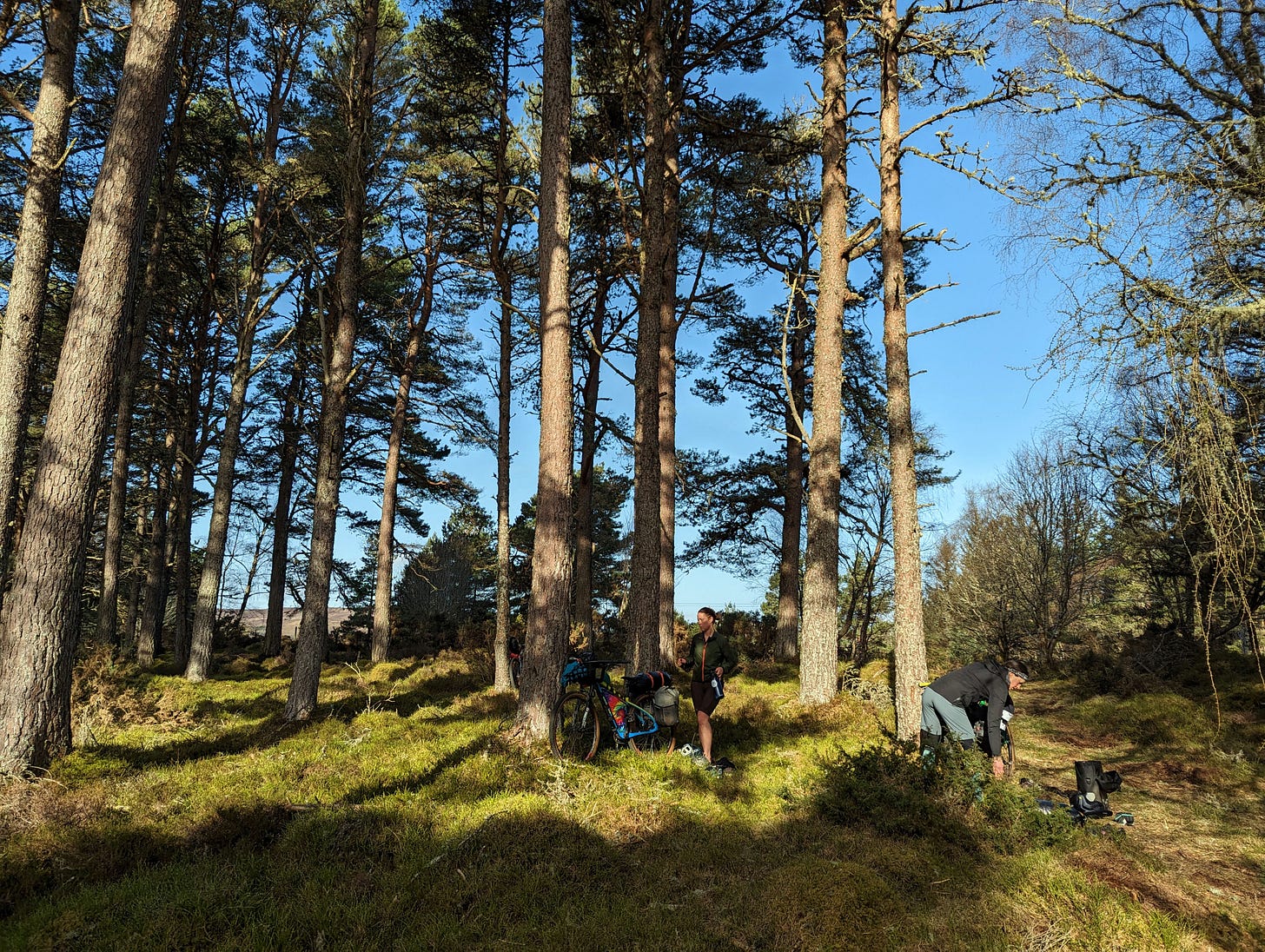Under the sky we are all free
Day one of an early-spring bikepack through the Scottish Highlands
“So what’s on your bucket list?”
Danni and I were ambling slowly down the dirt road near my home, daydreaming about better times. A cold breeze needled into my skin but I was too hobbled to move any faster — bruised ribs, bruised sternum, and a seemingly permanent bump on my chin where I smashed it into a rock while trail running a month earlier. Danni and I were supposed to be riding fat bikes in Leadville, but my mishap forced me to cancel yet another adventure with her due to injury (I did the same a year earlier with a truck-collision back injury and a backpacking trip through Zion National Park.)
So Danni pivoted to visiting me at home even when I tried to dissuade her — Boulder during the shoulder season of early December is an unexciting destination even without the limitations of an injured friend. But I suspected she wasn’t angling for a fun vacation. She wanted to check in and make sure I wasn’t drowning.
For my bucket list, I rattled off the usual suspects — places so distant and inaccessible that I’ll likely never visit, but holding them in my heart brings me comfort: Antarctica, Baffin Island, Greenland, the high Himalayas, Bhutan, Mongolia, Siberia. If I start with this list, it just keeps going. My desire to see and experience all I can squeeze into this short life is insatiable. This is why it feels especially cruel that my mental health — specifically, anxiety — has recently, all too often, kept me confined to my house. For days I’ll be too stressed and panicky to even go for a run. Instead, to work out the nervous energy that would otherwise drive me mad, I’ll spend hours riding an indoor bike trainer in front of a screen that takes me to imaginary worlds.
“And Scotland,” I concluded. “I’ve always wanted to see Scotland.”
Scotland was likely one of the first distant places to land a permanent place on this list, as I recall daydreaming about it as a seventh-grader. My best friend’s family hailed from Scotland; she had an official tartan and everything. We’d laugh at Mike Meyers on Saturday Night Live growling, “If it’s not Scottish, it’s CRAP!” I’d leaf through books with photos of the moorlands and purple heather and think this must be the most beautiful place on Earth.
“We should do it,” Danni suggested. “We should go bikepacking in Scotland.”
The trip came together quickly. I don’t even remember how, thanks to a strange fog that curtained my mind for much of the winter, but within a week I’d received confirmation e-mails from Danni and another Montana friend, Amber. They’d purchased tickets to Inverness for April 14-24, so I did the same. Danni’s Scottish friend Barry, who she met while racing the Silk Road Mountain Race in Kyrgyzstan last year, eagerly put together a route custom-made for our requests. By the New Year, Amber was sharing detailed gear lists and Danni was scheduling planning calls. It should have been exciting, but each of these gestures only gave me another shot of dread. My anxiety had become so bad that I was engaging coping mechanisms to ward off panic attacks nearly every day. How could I expect to pack up my bike and take it through crowded airports a third of the way around the world to ride 300 miles in the cold rain in Scotland?
I know it seems terribly privileged and ungrateful to have wonderful friends planning a fun trip to Scotland and write about the burden of it all. Mental illness is strange like that. No one can see it, it doesn’t show outwardly, and any symptom you experience is by definition in your head. So I just need to count on people believing me when I say that — for a few weeks at least — I felt as utterly incapable of biking through Scotland as I would if my legs were broken. That sternum injury had nothing on this monster. In fact, my physical injury through November and December was something of a relief. The physical pain masked the mental ache. I missed it when it slipped away.
Luckily, my friends were aware of what I was going through and kept the stoke alive even when I felt compelled to back out. If this had been a solo journey, I absolutely would have canceled my non-refundable ticket. A mid-Februray low point came right around the time I finally relented to trying antidepressants after years of resistance. The initial adjustment period was rough, but I started to come around surprisingly well. Without a month I almost felt “normal” — upbeat, adventurous, and excited for what might lie around the next bend. It’s an odd thing indeed to experience something like this in one’s own mind — like anyone with an ego, I’d always held onto a sense of self that was unique and unchangeable. I’d changed nothing except for a minuscule amount of a chemical in my brain. And yet I felt like a new person.
My travels to Inverness were amazingly smooth. Like most, I’ve had bad luck with air travel since Covid — long-delayed flights, hour-long security lines, missing bags, the works. My anxiety likes to zero in on agoraphobia, which is terribly unhelpful in crowded airports. But I had an evening flight from Denver to London with limited crowds. The two seats next to me remained empty. I even snoozed a bit overnight, landed in Heathrow, got a bunch of steps in while running down the clock for my purposefully long layover, collected my bike and got on a taxi without issue, and arrived at our hotel in time for the complimentary shot of evening whiskey (which I gave to Danni.)
Danni needed the whiskey, as she and Amber were not so lucky with their travel. Both of their bikes were stuck in airport limbo and Danni was trying to track them down. The uncertainty lingered through mid-morning, but ultimately they arrived in time to set out by 3 p.m.
Our first day was idyllic. The weather was cool and gray but not threatening, with a mild breeze and just a few sprinkles of rain in the evening. We had some trouble finding our way out of Inverness. Our GPS track was drawn as a point-to-point rather than a flowing track, which meant we sometimes had to connect dots that had more than one possible approach. I take pride in my GPS navigation but didn’t do as well on this trip, and it sometimes led to arguments. Incredibly, navigation was about the only conflict the three of us had during the week. The group dynamic was refreshingly in sync.
We finally found our way across the River Ness and climbed onto the Great Glen Way, a smooth trail that rolls along a forested ridge above Loch Ness. Both the trail and the landscape were much drier than I was expecting. My imagination still clings to the heather moors, while this area was much more like coastal California — a patchwork of thick pine forests, sage-like shrubs, and dry grassy hillsides. I suppose it makes sense. While this area has an oceanic climate that sees frequent rainfall, it doesn’t see heavy precipitation (39 inches annually, about the same as San Francisco.) And it’s quite cold, with the average high temperature spiking at 66 degrees in July. The mean temperature is 46 degrees in April, which is still late winter in Scotland.
I am a cold-weather creature though, and was perfectly happy to spin along through the cool forest air with nary a grass pollen particle or midge in sight. As we passed through the various trail links of the Great Glen Way, it was clear that Scottish folks take great pride in their surroundings — there was a lot of signage, usually private, and always artful and clever.
We dropped out of the hills near Urquhart Castle, a ruin that dates to the 13th century. We pedaled over to tour the castle, but visiting hours were already closed — it was after 7 p.m. I didn’t even realize it had gotten so late. The sky was still bright. It’s funny, because earlier that day, I asked the receptionist at the hotel what time it got dark in Inverness. She shrugged. “6, maybe 6:30.” I took her words at face value, but in fact, Inverness sits at a latitude near that of Juneau, Alaska — 57.4 degrees North — and by mid-April the sun didn’t set until close to 9 p.m.
“Some people just don’t spend much time outdoors,” I speculated about the receptionist’s miscalculation.
We left the castle and pedaled up a steep hill to the top of another ridge to find a spot to bed down for the night. In Scotland, that spot can be almost anywhere. As Barry advised us — “just don’t camp near a house and don’t camp in a farmer’s field.” Scotland has an enviable right-to-roam policy — the Land Reform Act of 2003 gives everyone rights to cross land and inland water through Scotland, with a few exclusions, as long as they behave responsibly. You don’t always have to be on the lookout for “No Trespassing” signs or landowners with guns. You are free.
This brings to mind a wonderful Twitter thread I read about an avid walker who was part of a Mass Trespass in 1932 that sparked this freedom in the United Kingdom.
His granddaughter wrote: “The afternoon before he died, Boxing Day 1978, he lit the still-temperamental meths stove and made tea. ‘Whatever the circumstances of anyone’s birth,’ he said, passing me his spare army-surplus enameled mug, ‘under the sky we are all free.’”
He swallowed a mouthful, his old-man jaw working, hoping I was listening. ‘Don’t be afraid of the worst that can happen. Ask instead, what is the best?’
I love both sentiments, but especially this: “Under the sky, we are all free.” It’s a reminder that no matter where you came from, or where life and circumstance take you, as long as you are alive, you are free to roam — if only in your head, or on the big screen in front of your Zwift bike. But it’s a start. And when you finally release yourself to roam freely, through all the discomfort and uncertainty, you’ll understand there is no greater freedom.
And so we set up our tents — Danni with only a bivy sack, as she is training herself physically and mentally to be tough for a bikepacking race in Armenia in June — and enjoyed Tesco-purchased sandwiches under the long twilight of Latitude 57. There was no place in the world I’d rather be.













Lovely. So glad you got on the plane and had fun!
Looking forward to reading the next instalment :-)
A lovely piece of writing and so glad to hear that you are getting better.